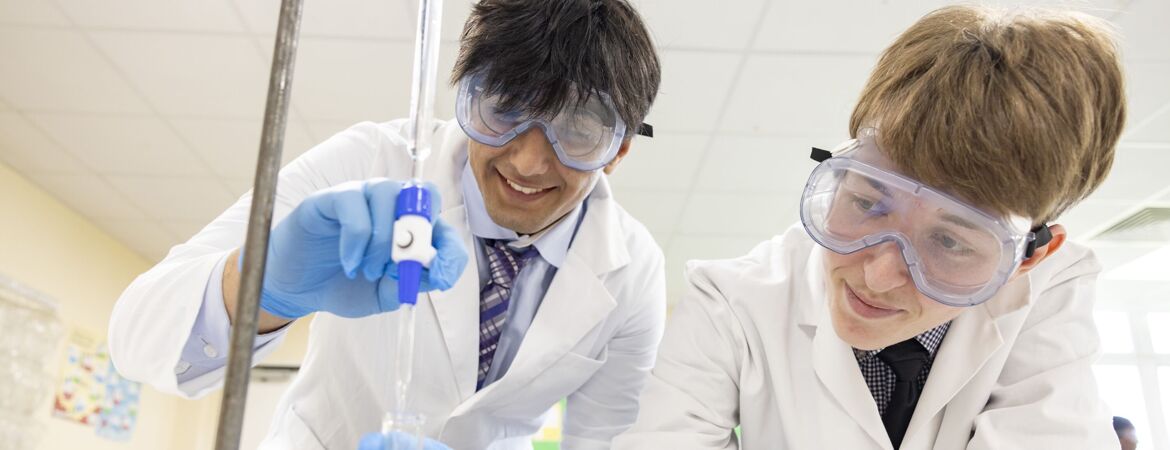 18th December
18th December
Science
The teaching programmes in Science are designed to develop a broad range of practical skills and processes, an understanding of scientific concepts and an awareness of the importance of Science in today’s society.
Facilities
Science lessons are taught in twelve modern laboratories, fully equipped for all school practical activities.
A level Biology
Course detailsOCR Biology A The OCR course content is split into 6 modules. Each of them building the knowledge of the previous one. Module 1 – Development of practical skills in biology Module 2 – Foundations in biology (Cells, biological molecules, enzymes) Module 3 – Exchange and Transport systems Module 4 – Biodiversity, evolution and disease Module 5 – Communication, homeostasis and energy Module 6 – Genetics, evolution and ecosystems The practical endorsement does not form part of the A level grade, but is reported separately. It is awarded based on completion of a minimum of 12 assessed practical activities carried out over the two years of the course. |
|||||||||
| Link to course specification | |||||||||
Assessment
|
|||||||||
Enrichment opportunitiesA range of enrichment activities will occur throughout the year including:
There will also be opportunities to enter local and national competitions e.g. Biology Olympiad. |
|||||||||
Student quotes“It is a great course as you get to understand the main processes of life” “I love the course because you learn about so many different topics, it is very varied and interesting” “The world finally starts to make sense!” “There are so many resources and the teachers give a lot of their time so it makes this hard A level seem much easier” |
|||||||||
ProgressionA level Biology is a rigorous and broad subject. It can be used as a springboard for many careers, including biological research, ecological and environmental careers, marine conservation, medicine, pharmacy, dentistry, pharmacology and teaching. The list is endless. |
A level Chemistry
Course DetailsOCR Chemistry A The Chemistry course teaches not only essential chemical concepts, but also a range of analytical and practical skills, which prepares students for more advanced scientific study. The course also studies some of the important applications of Chemistry such as the development of antibiotics, designer materials, pesticides and chemical dyes. During Year 12, students complete four modules of study:
This is followed by a further two modules in Year 13:
Over the two years of the course, students also complete a practical endorsement (this is reported separately from the overall A level grade) by undertaking a minimum of 12 assessed practical assignments. |
||||||||||
| Link to course specification | ||||||||||
Assessment
|
||||||||||
Enrichment opportunitiesA range of enrichment activities will occur throughout the year including:
There will also be opportunities to enter local and national competitions e.g. Chemistry Olympiad. |
||||||||||
ProgressionIn addition to various visits and visitors, students studying A level Chemistry have opportunities to complete placements in a number of scientific, engineering, medical and educational fields. A level students also have opportunities to collaborate with and support younger students, both in class and in other activities. These may include Science Club, Crest Awards and other events and competitions. |
A level Physics
Course detailsOCR Physics A This course covers the basis of how things work, from constituent parts of atoms out to the extent of the universe. Concepts that are studied are integrated with a range of practical experiments throughout each topic, giving the course both an academic and practical focus. The course incorporates both Astrophysics and Medical Imaging and covers the knowledge and understanding necessary to progress to STEM degrees and careers. During Year 12, students will complete four modules of study:
Then in Year 13, they will complete two further modules of study:
Students will gain practical skills throughout the course. These are assessed in the written examinations and in the practical endorsement. The practical endorsement is awarded based on completion of a minimum of 12 assessed practical activities carried out over the two years of the course. |
|||||||||||||
| Link to course specification | |||||||||||||
Assessment
|
|||||||||||||
Student quotes“The best thing about Physics is the practical lessons and learning how the world around us works.” “You have to work hard outside of class, but there are lots of resources and help available from the teachers.” |
|||||||||||||
Enrichment opportunitiesA range of enrichment activities will occur throughout the year including:
There will also be opportunities to work with Orbyts a research group that has run weekly for several months led by PhD students from UCL. The research group analyses images from a Mars orbiter to look for water signatures. The students learn how to interpret images and how to use coding to determine if the site meets the parameters to be categorised as a past water lake location. The group then will go to UCL to present their research as they believe they have found one of these such sites. |
|||||||||||||
ProgressionA level Physics is a highly regarded qualification because of its rigour and demanding nature. It can lead students on to a wide range of careers and university courses. From Physics degrees or degrees in a particular area of Physics (e.g. astrophysics, electronics, medical physics, lasers, quantum physics), to other related subjects such as engineering, meteorology, space, telecommunications, energy, finance or business management. |
|||||||||||||
Useful Links
|
Cambridge Advanced National in Applied Human Biology
Course detailsThe OCR AAQ Cambridge Advanced National in Human Biology (Extended Certificate) provides students with theoretical knowledge and practical experience of biology that gives them the skills to prepare for progression to University and relevant medical science sectors. The course, which is equivalent to 1 full A Level, is designed to be delivered across 2 years and includes 6 units of work. The units are: Unit 1- Fundamentals of Human Biology Unit 2- Health and Disease Unit 3- Genetics Unit 4- Biomedical Techniques Unit 5- Nutrition and Metabolism Unit 6- The Brain Students will complete practical assessments, presentations and produce written reports. They will also develop valuable transferable skills essential for higher education or employment such as problem solving, working in teams and organisation skills. |
||||||
| Link to course specification | ||||||
AssessmentExam Board - OCR
The overall qualification is graded using a scale of Pass to Distinction*. |
||||||
Enrichment opportunitiesStudents may take part in whole school and Sixth Form Open Evening to experience explaining the biological concepts and practical skills they are studying to younger students and parents. Students can also support younger pupils at Science Club as well as other activities |
||||||
ProgressionA Cambridge Advanced National in Human Biology provides a broad basis of study and allows for progression onto other related study, such as Higher Education courses in biological sciences, life sciences and human biology. |






